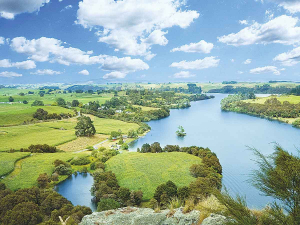94% of NZ farmers oppose Paris Agreement, survey shows
A survey of 2000 farmers shows 94% of respondents believe that remaining in the Paris Agreement for climate change is not in the country's best interest.
 Groundswell NZ is calling on all landowners to refuse access to public agencies undertaking surveys on private land.
Groundswell NZ is calling on all landowners to refuse access to public agencies undertaking surveys on private land.
After months of agitation and meetings around the country, a rural advocacy group has launched what it describes as the "first in a range of actions" to mobilise farmers against unworkable regulations.
Groundswell NZ is calling on all landowners to refuse access to public agencies undertaking surveys on private land - including Significant Natural Areas (SNA) and wetland surveys.
"Under the new Freshwater and Indigenous Biodiversity regulations, the Government is proposing it be mandatory for councils to survey all land within their districts for SNA assessments and wetlands," Groundswell NZ spokesman Bryce McKenzie claims.
He says farmers and landowners around the country are concerned about the misuse of this survey information.
"It has no caveats to protect landowners' privacy interests and no compensation of the impacts on property values," McKenzie adds.
"This shows a lack of respect for landowners who have been proactive in conservation. We already have a proven successful system with the QEII Trust covenants, which help landowners protect areas on private land."
Last week, Groundswell NZ wrote to all councils around the country demanding they halt mapping of natural areas on private land until these outstanding concerns were resolved.
"We have already had some councils indicate support for out campaign, as they too are fed up with the heavy hand of government and loss of flexibility for councils and communities to design their own plans," McKenzie claims.
He says Groundswell NZ is putting a stake in the ground and saying 'enough is enough'. The group says it wants to mobilise support and grow its campaign nationwide.
However, this stance on SNAs is in stark contrast to Federated Farmers. Feds environmental spokesman Chris Allen has accused Groundswell of "winding up farmers needlessly". He claims they are ignoring the fact that it's a two-year collaborative process and the final documenet has not been finalised. Allen told another media outlet that they "need to chill, wait until they see the final document".
Local Government NZ, which represents all councils around the country, told Rural News that the Government has made policy decisions around freshwater and biodiversity, which councils are required to implement.
"It's important to note that this is just the start of a long process, as the Government seeks to address a significant decline in New Zealand's biodiversity," a LGNZ spokesman says. "Councils are, or will be required to initially identify significant natural areas and wetlands and set rules regionally and locally for SNAs and enforce national rules re wetlands.
"It's also important to note that the National Policy Statement for Indigenous Biodiversity has not yet been finalised, and we note the overarching requirement to protect areas of significant vegetation is a matter of national importance and has been in place since 1991."
LGNZ's spokesman told Rural News that local government is aware there is a lot going on, particularly for the primary sector.
"We all need to look at this as a 'long game' which essentially requires some practices to change to better look after the environment - a goal that we think everyone can support."
Agrisea NZ has appointed Craig Hudson as it's new chief growth officer.
State farmer Landcorp, trading as Pamu, is a forecasting a full-year net profit of around $100 million.
Tony Aitken, chief executive of Ruralco, has been awarded the Excellence in Business Leadership Award at the ANZ Business of the Year Awards.
Global trade has been thrown into another bout of uncertainty following the overnight ruling by US Supreme Court, striking down President Donald Trump's decision to impose additional tariffs on trading partners.
Controls on the movement of fruit and vegetables in the Auckland suburb of Mt Roskill have been lifted.
Fonterra farmer shareholders and unit holders are in line for another payment in April.

OPINION: Here w go: the election date is set for November 7 and the politicians are out of the gate…
OPINION: ECan data was released a few days ago showing Canterbury farmers have made “giant strides on environmental performance”.